Related Research Articles

The Defense Security Cooperation Agency (DSCA) is an agency within the United States Department of Defense (DoD) which provides financial and technical assistance, transfer of defense materiel, training and services to allies, and promotes military-to-military contacts.
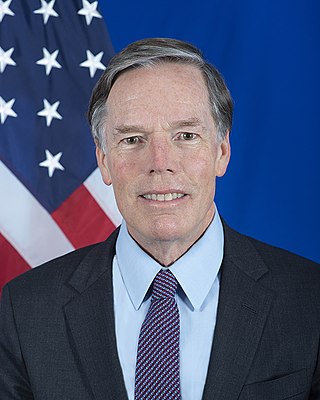
Robert Nicholas Burns is an American diplomat and academic who has served as the United States ambassador to China since 2022.
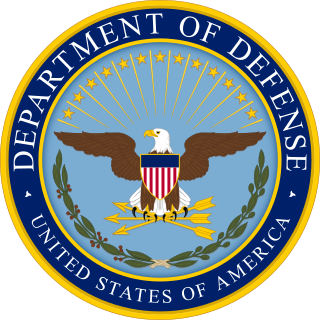
The United States under secretary of defense for policy (USDP) is a high level civilian official in the United States Department of Defense. The under secretary of defense for policy is the principal staff assistant and adviser to both the secretary of defense and the deputy secretary of defense for all matters concerning the formation of national security and defense policy.
The Leahy Laws or Leahy amendments are U.S. human rights laws that ostensibly prohibit the U.S. Department of State and Department of Defense from providing military assistance to foreign security force units that violate human rights with impunity. It is named after its principal sponsor, Senator Patrick Leahy (D-Vermont).
ICITAP is the acronym referring to the International Criminal Investigative Training Assistance Program, of the United States Department of Justice.
The United States government first recognized the usefulness of foreign aid as a tool of diplomacy in World War II. It was believed that it would promote liberal capitalist models of development in other countries and that it would enhance national security.
This article deals with the activities of the Central Intelligence Agency (CIA) of the federal government of the United States that constitute violations of human rights.

In the years after the September 11, 2001 attack on the World Trade Center in New York City, Yemen became a key site for U.S. intelligence gathering and drone attacks on Al-Qaeda. According to the 2012 U.S. Global Leadership Report, 18% of Yemenis approved of U.S. leadership, with 59% disapproving and 23% uncertain. According to a February 2015 report from the Congressional Research Service, U.S. officials considered Al-Qaeda in the Arab Peninsula the Al-Qaeda affiliate "most likely to attempt transnational attacks against the United States."
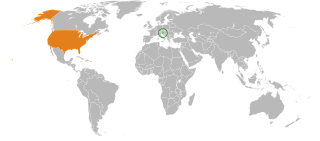
The United States has maintained an official presence in Slovenia since the early 1970s, when the United States Information Agency (USIS) opened a library and American press and cultural center in Ljubljana. From its opening through 1992, the American Center worked to develop closer grassroots relations between the United States and the people of the then-Socialist Republic of Slovenia, a constituent republic of the Socialist Federal Republic of Yugoslavia. On December 23, 1990, the Slovene people voted in a plebiscite to separate from greater Yugoslavia. On June 25, 1991, the new Republic of Slovenia officially declared its independence from the Federal Republic of Yugoslavia. A 10-day war commenced, during which Slovenian territorial troops fought off incursions by the Yugoslav People's Army. The United States formally recognized the new republic on April 7, 1992. To develop U.S. diplomatic relations with the new state, the United States opened a new Embassy in Ljubljana in August 1992. From the departure of Yousif Ghafari in January 2009 till November 2010, the U.S. Ambassador position was vacant. From November 2010 to 2015 it was held by Joseph A. Mussomeli. The Ambassador position is currently held by Jamie Harpootlian.
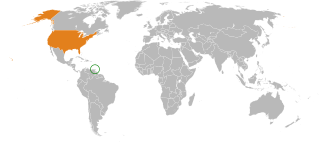
Trinidad and Tobago – United States relations are bilateral relations between Trinidad and Tobago and the United States.
United States Security Assistance Organizations (SAOs) are U.S. government military and civilian personnel stationed in foreign countries to manage security assistance and other military programs. SAOs are closest to these programs' operation and have the closest contact with host-country militaries.
The United StatesForeign Military Financing (FMF) program provides grants and loans to friendly foreign governments to fund the purchase of American weapons, defense equipment, services and training. The program was established through the 1976 Arms Export Control Act and is overseen by the Office of Security Assistance within the Bureau of Political-Military Affairs of the United States Department of State and executed by the Defense Security Cooperation Agency (DSCA) of the United States Department of Defense. The program's stated aims are to be promote U.S. interests by "ensuring coalition partners and friendly partner governments are equipped and trained to pursue common security objectives by contributing to regional and global stability, strengthening military support for democratically-elected governments, fighting the War on Terror, and containing other transnational threats including trafficking in narcotics, weapons and persons."
A foreign area officer (FAO) is a commissioned officer from any of the six branches of the United States Armed Forces who is a regionally focused expert in political-military operations. Such officers possess a unique combination of strategic focus and regional expertise, with political, cultural, sociological, economic, and geographic awareness. Foreign language proficiency is necessary in at least one of the dominant languages in their specified region.
The United States Department of Defense's Foreign Military Sales (FMS) program facilitates sales of U.S. arms, defense equipment, defense services, and military training to foreign governments. The purchaser does not deal directly with the defense contractor; instead, the Defense Security Cooperation Agency (DSCA) serves as an intermediary, usually handling procurement, logistics, and delivery, often providing product support, training, and infrastructure construction.
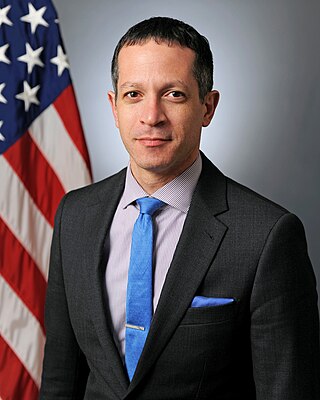
Michael C. Horowitz is an American international relations scholar currently serving as U.S. Deputy Assistant Secretary of Defense for Force Development and Emerging Capabilities in the Office of the Under Secretary of Defense for Policy in the Biden administration. Prior to joining the Defense Department in April 2022, he was a professor of political science at the University of Pennsylvania.

The military relations between Pakistan and the United States have been present since the two established diplomatic relations in 1947. The United States and Pakistan's military have historically close ties and it was once called "America's most allied ally in Asia" by Dwight D. Eisenhower, reflecting shared interests in security and stability in South Asia, Central Asia as well as in regions covering Eastern Europe.
Bonnie S. Glaser is managing director of the Indo-Pacific Program at the German Marshall Fund of the United States. She was previously a senior adviser for Asia and the founding director of the China Power Project at the Center for Strategic and International Studies. Glaser is also a non-resident fellow with the Lowy Institute in Sydney, a senior associate with CSIS Pacific Forum, and a consultant for the U.S. government on East Asia. Glaser writes extensively on Chinese policy, including its foreign and military policy towards the United States., Cross-Strait relations, China's relations with Japan and Korea, Chinese perspectives on missile defense, and multilateral security in Asia.

Sue Mi Terry is a Korean-American international relations scholar currently serving as a senior fellow at the Council on Foreign Relations. A former intelligence analyst specializing in East Asia, Terry is regularly quoted in print and web media as an expert on international politics involving North Korea, South Korea and Japan.
Zack Cooper is an American national security and foreign policy analyst currently serving as a senior fellow at the American Enterprise Institute (AEI), an adjunct assistant professor at Georgetown University, and a lecturer in Public and International Affairs at Princeton University. He also serves on the advisory boards of the Open Technology Fund and the Foundation for Defense of Democracies' Center on Sanctions and Illicit Finance.
References
- ↑ Nye Jr., Joseph S.; Owens, William A. (1996-03-01). "America's Information Edge". Foreign Affairs. Vol. 75, no. 2. ISSN 0015-7120 . Retrieved 2024-05-16.
- ↑ "International Military Education and Training - Agencies Should Emphasize Human Rights Training and Improve Evaluations" (PDF). U.S. Government Accountability Office. October 2011. Retrieved 15 May 2024.
- ↑ "Security Assistance Team". U.S. Department of State. Retrieved 15 May 2024.
- ↑ "DSCA -- FAQs". Archived from the original on 2009-08-19. Retrieved 2009-07-30.
- ↑ Johnston, Jason A.; Taylor, Stephen C. (June 2010). "Effective and Efficient Training and Advising in Pakistan" (PDF). Defense Technical Information Center. Retrieved 16 May 2024.
- ↑ Cohen, Zachary; Starr, Barbara (6 December 2019). "Here is what we know about the US military's program to train foreign troops". CNN. Retrieved 15 May 2024.
- ↑ "International Military Education and Training". Archived from the original on 2020-01-02. Retrieved 2020-01-03.
- ↑ Sokou, Katerina (2019-12-28). "East Med Act a milestone in US foreign policy". www.ekathimerini.com. Retrieved 2024-05-15.
- ↑ "FY 2009 Congressional Budget Justification for Foreign Operations". U.S. Department of State. Retrieved 15 May 2024.
- ↑ Cope, John A. (October 1995). International Military Education and Training - An Assessment (PDF). Washington D.C.: Institute for National Strategic Studies. p. 8.
- ↑ Unmatched power, unmet principles : the human rights dimensions of US training of foreign military and police forces (PDF). New York: Amnesty International USA Publications. 2002. p. 5. ISBN 1887204342 . Retrieved 16 May 2024.
- ↑ Tian, Dr. Nan (2021-09-22). "20 years of US military aid to Afghanistan | SIPRI". www.sipri.org. Retrieved 2024-05-15.
- ↑ Quarterly Report to the United States Congress 2021-QR-3 (PDF). Arlington, Virginia: U.S. Government. 30 July 2021. p. 166.
- ↑ Tarnoff, Curt (12 August 2021). "Afghanistan: U.S. Foreign Assistance". Congressional Research Service. p. 22. Retrieved 15 May 2024.
- ↑ Schenker, David (2017-05-10). "Egypt's Failed War on Terror". Foreign Affairs. ISSN 0015-7120 . Retrieved 2024-05-16.
- ↑ Ashour, Omar (2015-11-08). "Sinai's Stubborn Insurgency". Foreign Affairs. ISSN 0015-7120 . Retrieved 2024-05-16.
- 1 2 Iqbal, Anwar (11 August 2018). "US cuts military training programme for Pakistan". Dawn . Retrieved 15 May 2024.
- ↑ Epstein, Susan B.; Kronstadt, K. Alan (1 July 2013). "Pakistan: U.S. Foreign Assistance" (PDF). Congressional Research Service. p. 25. Retrieved 16 May 2024.
- ↑ Siddiqa, Ayesha (2023-04-04). "Pakistan has walked dangerously deep into Chinese grip. Wake up, West". ThePrint. Retrieved 2024-05-15.
- ↑ "U.S. Unfreezes Pakistani Military's Participation In Training Program". Radio Free Europe/Radio Liberty. 2019-12-24. Retrieved 2024-05-15.
- ↑ Landay, Jonathan (19 December 2019). "U.S. to resume military training program for Pakistan - State Department". Reuters. Retrieved 15 May 2024.
- ↑ Kronstadt, K. Alan (22 May 2023). "Pakistan and U.S.-Pakistan Relations". Congressional Research Service. p. 11. Retrieved 16 May 2024.
- ↑ MacLachlan, Karolina (August 2015). "Security assistance, corruption and fragile environments : Exploring the case of Mali 2001-2012" (PDF). Transparency International U.K. p. 8. Retrieved 16 May 2024.
- ↑ Mazzei, Patricia; Schmitt, Eric (2019-12-10). "Pentagon Restricts Training for Saudi Military Students". The New York Times. ISSN 0362-4331 . Retrieved 2024-05-15.
- 1 2 Taw, Jennifer M. (1993). The Effectiveness of Training International Military Students in Internal Defense and Development. Santa Monica: RAND Corporation. p. 13. ISBN 978-0-8330-1346-0.
- ↑ Kurlantzick, Joshua (8 June 2016). "Reforming the U.S. International Military Education and Training Program" (PDF). Council on Foreign Relations. Retrieved 2024-05-15.
- ↑ Jin, Syrus (2024-05-16). "Can the U.S. Rewrite Its Tortured History of Aid to the Philippines?". Foreign Policy. Retrieved 2024-05-16.
- ↑ Keating, Joshua E. (2024-05-16). "Trained in the U.S.A." Foreign Policy. Retrieved 2024-05-16.
- ↑ Bork, Ellen (2024-05-16). "Beware of Mirages". Foreign Policy. Retrieved 2024-05-16.
- ↑ Stremlau, John J. (2000-07-01). "Ending Africa's Wars". Foreign Affairs. Vol. 79, no. 4. ISSN 0015-7120 . Retrieved 2024-05-16.
- ↑ Adams, Gordon (2024-05-16). "Continental Shift". Foreign Policy. Retrieved 2024-05-16.